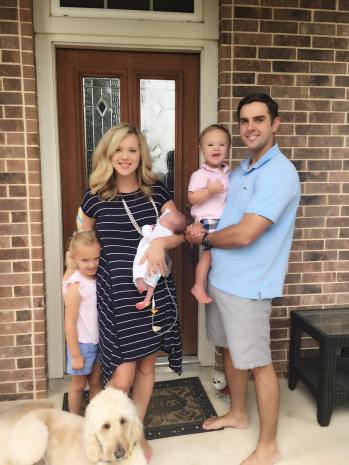“When my son was born my husband and I were so scared. The doctors never said Down syndrome, but you could tell something was wrong. We didn’t know anyone with Down syndrome. We were so worried.”
You could take the above quote from the mouth of just about any of the 220,000 moms giving birth to a child with Down syndrome worldwide each year. But the level of fear and worry changes drastically depending on where you live.
In the densely populated, mostly rural, tiny mountainous country of Rwanda, Edwige Musabe says it’s like Trisomy 21 doesn’t even exist. Her discovery of Down syndrome starts with the quote above; at the 2008 birth of her first born son, Yuhi (pronounced “U-ee”).

“Mental disability is invisible in Rwanda. The government doesn’t talk about these people. They’re not included. The parents don’t want to talk about it, because of the shame. They believe they’re to blame. They’re hidden in plain sight,” Edwige recently told me on FaceTime from her Rwandan home.

Related: Advocates Urge U.S. Congress to Increase Funding for Down Syndrome Research
Edwige, her husband, Gilbert, and their son Yuhi were among the very lucky. “Although we love Rwanda and will stay here, we had lived in Canada for many years and knew we would have to go there to get the answers we desperately sought,” Edwige says. There are at least 400 identified people with Down syndrome living in Rwanda. But with a population of 12 million and the statistic of Trisomy 21 affecting at least 1 in 1,000 births every year, simple math proves that number to be a low estimate.

A number of troubling policies and stigmas have led to that low estimate. Rwandans must leave Africa to get an official blood test to confirm the diagnosis. Yuhi was officially diagnosed in Canada. Babies born with heart defects are turned away from hospitals there. Doctors tell them heart operations are reserved for typical children. “Parents can’t afford to send their child to India for heart surgery. Sadly, these children die,” Edwige explains. Early intervention, special education, OT, PT, speech? Nonexistent, unless you can afford it privately.
Read below to find out what you can do to help people with Down syndrome in Rwanda!
But Edwige had seen the possibilities in Canada, and wants better for her countrymen. A natural advocate, she started investigating how to start a national organization to support parents and their children with Down syndrome. She found Down Syndrome International (DSi) through Dr. Mutesa Leon, whom Edwige says is the only doctor in all of Rwanda knowledgeable about Trisomy 21.

Down Syndrome International (DSi) is a non-profit based in the United Kingdom, but serves member organizations in 23 countries including Albania, Bangladesh, Botswana, Colombia, Guatemala, Jamaica, Madagascar, Malawi, Mauritius, Myanmar, Nepal, Nigeria, Pakistan, Peru, Rwanda, Sri Lanka, Tajikistan, Tanzania, Turkey, UAE, Uganda, Zambia, Zimbabwe.
DSi Outreach Coordinator, Nathan Rowe, says they give financial, advocacy, and organizational assistance to mostly grassroots groups. “Some are made of a group of parents who meet regularly and work voluntarily, while some have a few paid staff. Generally organisations are made up of parents and family members or other people who have a personal interest in improving the lives of people with Down syndrome in their country,” Nathan Rowe explains.
Related: Social Media Gives Self-Advocate Voice
Dr. Mutesa Leon and Edwige used a small amount of funds from DSi to start the Rwanda Down Syndrome Organization (RDSO). With the money they hired a permanent secretary, and opened a small office building with a telephone in the capital city of Kigali at the beginning of 2017. “People don’t use social media in Rwanda, so radio and telephone is how you reach the most people; even in the most remote parts of Rwanda. The wealthiest radio stations have allowed us to spread our message for free. We tell listeners to call us, visit us, or go to their nearest hospital for resources, and lots of people are calling,” Edwige explains.

A group of about 100 families also met in the capital city for World Down Syndrome Day 2017. “It was an amazing experience. For the first time, we didn’t feel alone. The more people we reach, the more we can advocate, and the louder our voices will be heard” Edwige says.
Edwige says a lot more needs to be done. Donations are important, but Edwige says free expert advice on how to advocate and provide services for their loved ones would be even more affective. “My dream is to have a center for my son Yuhi and all Rwandans living with Down syndrome. They could go there for therapies, education and social interaction. We need experts to teach us about best practices. Dr. Leon is also trying to get doctors to come here to do heart surgeries to save our children,” Edwige explains.
To learn more about the other countries Down Syndrome International supports click here, and to donate to those countries click here.
If you are interested in donating to Rwanda Down Syndrome Organization specifically, please reach out to Edwige Musabe at emusabe.ed@gmail.com.
What have you noticed about the similarities and differences in caring and advocating for people with Down syndrome in different countries? Share your experiences with me below! I’d love to share your story on Inclusion Evolution!














 If they would have asked Sean they might have learned that he if fully capable: an Eagle Scout, George Mason LIFE graduate, employee who lives independently. Even if they didn’t think he was capable after speaking to him, at least they wouldn’t have assumed incompetence based solely on a visible disability.
If they would have asked Sean they might have learned that he if fully capable: an Eagle Scout, George Mason LIFE graduate, employee who lives independently. Even if they didn’t think he was capable after speaking to him, at least they wouldn’t have assumed incompetence based solely on a visible disability.



